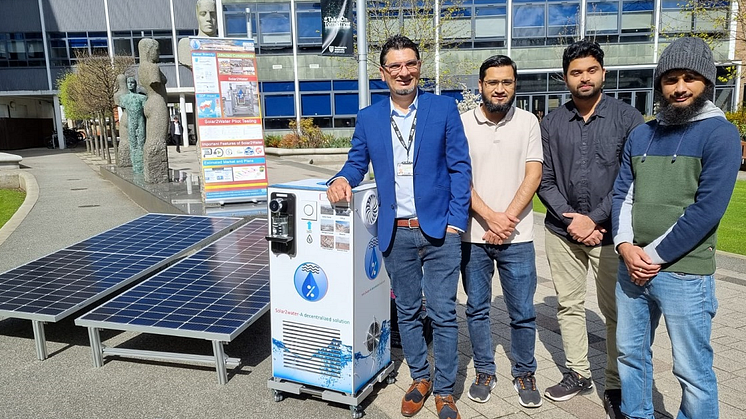Press release -
EXPERT COMMENT: Hundreds of rivers and lakes cross international borders – countries need to commit to sharing the water
In an article originally written for The Conversation, Professor Alistair Rieu-Clarke explains the importance of nations working together to protect their shared river basins and the impact that these resources have on improving or damaging international relations.
The Danube River starts in Germany and eventually flows into the Black Sea some 2,850 kilometres and ten countries later. If Germany were to dam or pollute the river, it could potentially affect nine other countries – and four of their capitals.
The Danube may be the world’s most multinational river, but it’s only one of an estimated 310 rivers and lakes shared between two or more countries, along with 468 underground water sources known as aquifers. I recently went to New York to a major UN conference – the first dedicated to water in decades – to try and help strengthen political commitment over these “transboundary” bodies of water.
It’s a crucial issue, as these shared water resources can be both a source of conflict and a driver of cooperation, sustainable development and peace. In wars such as those in Ukraine or Syria, water and infrastructure like bridges or sewers have been repeatedly targeted for their strategic value.
Tensions are also running high in Africa because Ethiopia is constructing a large dam on the Nile, upstream of Egypt. At a recent meeting of the Council of Arab Foreign Ministers, Egypt’s Sameh Shoukry warned of the “fatal consequences for Egypt’s national security” of “unilateral Ethiopian practices on … common river basins”.
Conversely, jointly managing the Sava River (the Danube’s longest tributary) since 2001 helped build peace and trust between former Yugoslav republics less than a decade after they had been at war. And when the mighty Paraná River – South America’s second largest – almost dried up in 2021, Brazil, Paraguay and Argentina were able to share the limited water supplies peacefully and sustainably.
Such positive examples of cooperation are particularly pertinent given the increasing pressures that climate change places on the world’s water resources.
How to make sure countries share their water
Effective legal and governance arrangements are key. For example, Canada and the US can point to well over 100 years of cooperation through the 1909 Boundary Water Treaty and the International Joint Commission. Similarly, a peace treaty between Brazil and Paraguay in 1966 led to the creation of a binational commission and eventually to one of the world’s largest hydroelectric dams on the Paraná.
Governance arrangements are also capable of both managing conflict and cooperation simultaneously. Hungary and Slovakia have a long-running dispute over the implementation of a 1970s soviet-era hydropower project on the Danube, the Gabčíkovo-Nagymaros project.
But the countries have still worked together through the international Danube River commission to manage water across the basin. And in Asia, there have been examples of cooperation over the Indus (shared by India and Pakistan) and lower Mekong (Cambodia, Loas, Vietnam and Thailand) rivers even while the countries that share them were at war.
As unifying entities, basin organisations can take on responsibilities well beyond water itself. For example, within the context of threats from Islamist militant group Boko Haram, the Lake Chad Basin Commission is able to not only manage shared waters but also promote regional integration, peace, security and development.
Unfortunately, there are not enough of these governance arrangements in place. The UN bodies responsible for monitoring progress say only 24 countries have all their transboundary basin areas covered by cooperation agreements. The situation is particularly stark in the case of groundwater, where only eight groundwater-specific legal arrangements are in place.
Notable commitments – but still not enough
One of the key themes of the UN water conference was cooperation. This led to some notable commitments. A newly-established Transboundary Water Cooperation Coalition could coordinate countries, international organisations, academia and NGOs.
Also, several countries, including Iraq, Namibia, Nigeria and Zambia, formally joined or committed to joining at least one of the two UN water conventions. These are the 1992 Convention on the Protection and Use of Transboundary Watercourses and International Lakes and the 1997 Convention for the Law of the Non-navigational Uses of International Watercourses. Based on customary international law, they both set out basic principles by which countries can cooperate over their shared waters.
The 1992 convention, with its institutional framework – which includes three yearly meetings of the parties and various expert working groups – acts as a global forum for the exchange of best practice and the development of useful guidance and other tools to support transboundary cooperation.
Do these commitments provide the requisite step change? The short answer is no. Global pressures on transboundary waters due to population increase, growing water demands, unsustainable consumption patterns, environmental degradation and biodiversity loss, and climate change, require urgent attention.
It is positive that over 20 countries have promised to join one or both water conventions. But currently only about a third of all countries sharing transboundary waters are party to one or both conventions.
The UN’s 2023 water conference may well go down as an important stepping stone in securing commitment on transboundary water cooperation, but much will depend on what countries deliver in the months and years to come.
Topics
Categories
UNIVERSITY OF THE YEAR 2022 (Times Higher Education Awards)
Northumbria is a research-intensive university that unlocks potential for all, changing lives regionally, nationally and internationally. Find out more about us at www.northumbria.ac.uk
--- Please contact media.communications@northumbria.ac.uk with any media enquiries or interview requests ---







